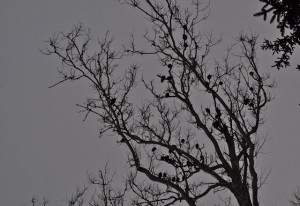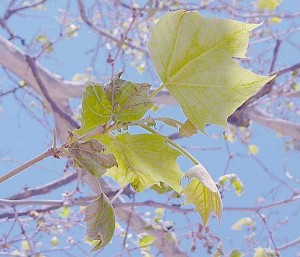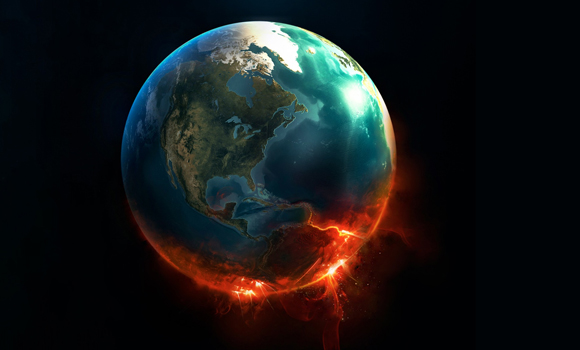Following a meditation under the massive old sycamore, I drop down the short, steep bank to the shallow stream. Standing under and little way away from the tree, I see as never before how it is slowly but visibly dying. Palpably, one realizes that the land all around is vanishing. The untamed earth and untrammeled humanity are fast disappearing.
 A decade ago, a fire scarred the white bark of the great, V-shaped sycamore. Two large limbs have withered and broken off in the last year or so, and though it’s hard to tell in winter which branches remain healthy enough to grow leaves and which don’t, most of the limbs look sickly.
A decade ago, a fire scarred the white bark of the great, V-shaped sycamore. Two large limbs have withered and broken off in the last year or so, and though it’s hard to tell in winter which branches remain healthy enough to grow leaves and which don’t, most of the limbs look sickly.
It was a magnificent tree to meditate under before the fire that swept across the fields and seasonally-dry streambed ten years ago, and it saddens me that it won’t be here for future generations of contemplatives (if there are any) to meditate in the shade of its broad leaves.
In years past, after a sitting under the majestic sycamore and in a meditative state, one felt, looking across the unspoiled fields and foothills, the essence of the earth. Now, at the same spot, one feels only the essence of man, and human sorrow.
The sycamore’s death doesn’t feel like a natural process, but signifies something much deeper and wider—the slow death of the earth and humanity at the hands of man. (Humanity includes man, but man does not include humanity.)
A hundred meters behind me, people go by on bikes and foot. I wonder if there are any who notice the change.
The sycamore has been imperceptibly drawing into itself, sprouting fewer leaves each year, and giving rise to a new generation of saplings that circle its base. For the last few years I’ve questioned if there was any deeper significance to the tree’s slow death, and today, at an emotional rather than verbal/conceptual level, I had my answer.
Now I know in my heart what before I had only intuited and perhaps held at bay—the earth is dying at the hands of man. Man must die (not physically or violently, but within people that still care about this planet and humanity) for the human being to be born and the earth to be restored, or one way or another, humankind will perish from the face of the earth.
A hundred meters from the bike path, I hadn’t thought many people noticed me sitting under the tree. But a year ago I walked up from the creek to converge and converse with a woman living in the nearby apartments who said this little stretch of nature was her lifeline. Then she took a call on her cell while we were talking. “I’m talking to a little Buddha,” she sarcastically quipped to her friend.
Incongruously on this day, there are very few man-made noises beside the dwindling creek, which, for now, still  forms the perimeter of the town. Strangely, the sounds of the lightly lapping stream predominate, not the traffic din from the arteries a half-mile away, or pounding and back-up beepers from the big, steel-girdered construction site a quarter mile behind me.
forms the perimeter of the town. Strangely, the sounds of the lightly lapping stream predominate, not the traffic din from the arteries a half-mile away, or pounding and back-up beepers from the big, steel-girdered construction site a quarter mile behind me.
I’m thankful for the solitude and quiet. A question arises: Is all noise man-made? Yes, there are no noises in nature, just sounds. Even the eruption of Krakatoa in the Dutch East Indies in 1883, the loudest sound since beginning of human history (loud enough to be plainly heard in San Francisco if it had exploded in New York), was not noise per se, though it shattered the eardrums of fishermen for hundreds of miles.
The kite-hawks no longer flutter in place over the fields, gently plummeting to the ground when they spot prey. They have fled the fields, probably for good, and the area has lost the feel of the earth, having become saturated with man. I haven’t seen a coyote, big-eared rabbit, or rattlesnake in years, and haven’t even heard a pheasant squawk since the construction started come to think of it.
In a meditative state one feels the essence of human sorrow. That’s no doubt one reason why so few awaken, since there’s no escaping it once one does.
Collective sorrow is hard to distinguish from personal sorrow, especially since the self is the source of sorrow. But in complete negation in observation, the sorrow of the ‘me’ recedes into insignificance, and the collective phenomenon is felt, without one being separate from it. The feeling then is more akin to pathos than sorrow, or even sadness. Remaining with it, compassion grows within one.
What is an adequate response of the individual, who is just one of over 7 billion that comprise the human crisis? I heard the other day that just 85 of the world’s riches people have amassed as much wealth in their greedy, grasping hands and banks as nearly half the world’s population. Three and half billion people!
If 85 people can be so destructive (and yes I know, some good is done with the money after the pillaging is over), a thousand or a million people (which is still only .014% of 7 billion), who are truly transforming, could creatively outweigh the pillagers of the earth.
After all, the rich aren’t a different species, but are essentially the same as all of us, and are within each our consciousness. Radical change therefore begins within each person, and a few people thinking together can make a huge difference.
Even in one’s backyard, with the noise of the neighbors, cars and various machines, one can listen and look, without the division as the observer and self. In so doing, one leaves the desiccated chrysalis of man behind within oneself, and grows into a human being, as surely we are meant to do.
Martin LeFevre

